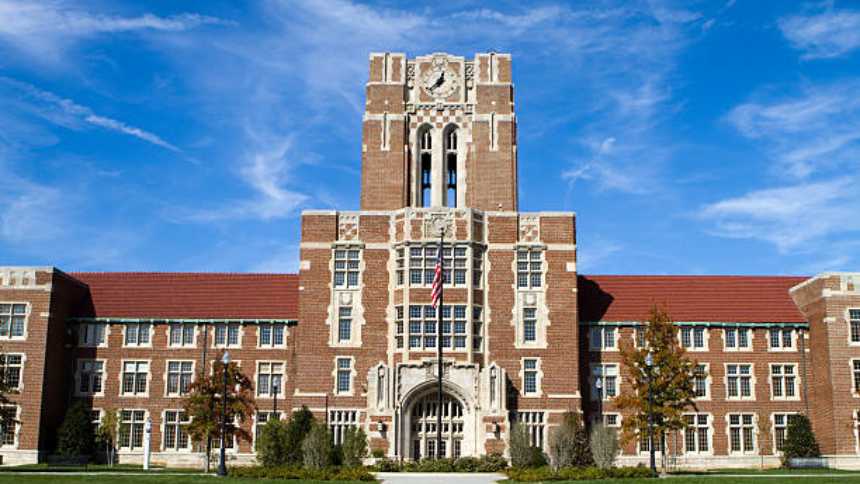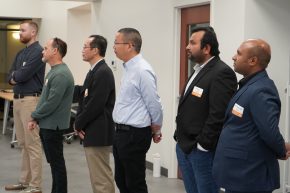
Eight make their pitches, now await the results
Those pitching were part of the inaugural "Chancellor's Innovation Fund" that is designed to help researchers overcome a technological challenge toward commercialization.
They applied, made the cut, made their pitches, and now wait to see how many of the eight faculty researchers at the University of Tennessee, Knoxville (UTK) will receive up to $50,000 to advance their ideas to the next level.
They made the cut for the inaugural “Chancellor’s Innovation Fund,” a program designed to raise awareness, promote innovation, and support entrepreneurship for UTK’s promising innovators. It is administered by the Office of Research, Innovation, and Economic Development (ORIED).
As described in this recent teknovation.biz article and reinforced during Friday afternoon’s pitch event, the goal is to advance research and discoveries that make life and lives better. “It helps researchers prove the commercial viability” of their ideas by funding a milestone like prototyping and another form of proof of concept, according to Rob Coleman, ORIED’s Director of Entrepreneurship and New Ventures.
The ideas represented a truly spectrum, ranging from something called the SmartCyPad to the fLEX testing device for athletic fields and a nature-inspired solution to protect proteins and cells from freezing.
Coleman said there will be a follow-up event later this year where the winners will be announced. Between now and that event, there will be discussions about milestone-based goals.

Those asking questions after each pitch were: (1) John Bruck, Director of the Spark Innovation Center at the UT Research Park at Cherokee Farm; (2) Carol Seamons, a former banker and now Director of Engagement for Spark; and (3) Grady Vanderhoofven, President and Chief Executive Officer of Three Roots Capital.
- Jian Liu, an Assistant Professor in the Tickle College of Engineering, launched the pitches with his concept of the SmartCyPad which, among other uses, would monitor cadence among both virtual and regular cyclists. He first conceived the idea in late 2021 and most recently submitted a proposal to the National Science Foundation for funding.
- Jordan Cannon, a Graduate Research Assistant in Microbiology at UTK, presented an idea developed with Todd Reynolds, an Associate Professor of Genome Science and Technology, that they billed as Circular Biosciences. It involves the use of polylactic acid, also known as PLA, a thermoplastic monomer derived from renewable, organic sources such as corn starch or sugar cane. Using biomass resources makes PLA production different from most plastics, which are produced using fossil fuels through the distillation and polymerization of petroleum. Cannon said PLA is mostly used in packing materials.
- Jun Lin, a Professor of Animal Science in the UT Institute of Agriculture, has spent a 35-year career in microbiology and immunology. Noting that microplastics are everywhere, he asked, Are they harmful?” Lin explained that there is not a cost-effective analytic tool currently available.
- Pritesh Yeole is a Researcher in UTK’s Fibers and Composites Manufacturing Facility as well as Co-Founder of Aligned Composites Technology, a participant in Cohort 2 of the “Spark Cleantech Accelerator.” The start-up specializes in creating nonwoven mats specifically designed for fiber-reinforced composites with a focus on carbon, glass, and natural fibers. Yeole said the funding would help reach the goal of having a pilot production line up and running by the end of 2024.
- John Sorochan is an internationally recognized expert on turf, a Distinguished Professor of Turfgrass Science and Management at UTK, and Co-Director for the Center for Athletic Field Safety. These days he is focused on providing fLEX, a testing device that Sorochan says will “give a green light, red light or yellow light” on the playability of an athletic field from the perspective of athlete safety. Explaining that 20 percent of injuries in sports are attributable to field conditions, he would use the funding for software development for a Cloud-based service. We spotlighted Sorochan’s work in this September 2022 teknovation.biz article. Earlier, he created a start-up named QuickSod Inc.
- Tao Wu is an Associate Professor of Food Science at UTK who is widely published on the topic of ice recrystallization inhibitors. They are novel cryoprotective agents that can reduce the freezing damage of cells, tissues, and organs in cryopreservation. One of those inhibitors is bile salt, and he proposed a small-scale validation study. Wu talked about bile salts being a nature-inspired solution.
- Like Sorochan, Jian Huang is another somewhat seasoned entrepreneur who launched a start-up named Survature. On Friday he presented the idea for an artificial intelligence enabled data intelligence engine that would provide VaaS, defined as Visualization-as-a-Service. Explaining that nonprofits were his test market for helping write funding proposals, Huang added that he was already working with the United Way of Greater Knoxville.
- Ahmed Aziz, an Assistant Professor of Electrical Engineering and Computer Science, wrapped up the pitches with his presentation on reimagining superconducting processors, particularly where there are extreme energy demands. He told attendees that he started this journey three years ago and wants to “reinvent the field of computing.”
Like what you've read?
Forward to a friend!

